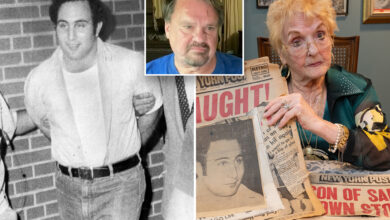Jews embrace tattoos to cope with heartbreak of Hamas terror attack

Tattoos are taboo to many Jews, but the atrocity of Oct. 7 has changed a lot of minds about how pain leaves its mark.
“I’m a nice Jewish boy from New Jersey,” said Todd Elkin, a former Wall Streeter who now works for his family’s commercial cleaning business.
“I never imagined doing this, but Oct. 7 changed everything. I now have two tattoos.”
The good news is his Jewish mother is still talking to him.
“I’m close with my mother, like every other Jewish boy,” said the 54-year-old from Marlboro, NJ.
“I had to approve it with my mother. She’s 80 and I’m still afraid of her.”
The non-religious, married father of two was “devastated” after the slaughter of 1,200 Israelis by Hamas terrorists, and responded by making donations to Friends of the IDF and to help send armor to soldiers.
“But I felt like there had to be more,” he said.
With a daughter away at college in the Midwest, and relentless anti-Israel campaigns raging on campuses across the country, Elkin was fed up with the “from the river to the sea” crowd.
He inked a plan to take a “stance.”
“I’m not 20. This was by no means impulsive,” he said, before settling on a bicep tattoo in Hebrew that reads “Am Yisrael Chai,” which means “The people of Israel live.”
“This is my way of fighting back, of showing my support for Israel,” said Elkin, adding, “This is just for me.”
He was careful in choosing a tattooist.
“I wanted an Israeli and Jewish tattoo artist,” Elkin said of his decision to tap former Williamsburg resident May Hillel Levit.
She moved to the Miami area this summer after increasing antisemitism in the wake of the Hamas massacre left her “scared” to send her young son to daycare, she said.
A steady stream of new customers, including seniors, have made their way to Levit since the assault on her homeland.
“I get a lot of old people, people who didn’t even think about getting a tattoo in their life,” Levit said, noting the first client who wanted to commemorate Oct. 7 walked in three days after the terror attack and asked for a star of David.
New clients have confessed to her, “I want something to show the world that I’m a proud Zionist and a proud Jew,” Levit, 30, recounted.
Common motifs include Jewish stars, the Hebrew symbol “chai,” meaning life, and the message, “We will dance again,” a tattoo former hostage Mia Schem inked on her forearm shortly after her release from 55 days in Hamas captivity.
Others wanted to honor Hamas victims like Shani Louk, the 22-year-old German-Israeli tattoo artist whose lifeless body was paraded on a truck in Gaza after she was kidnapped at Nova.
“I’m not a general, I’m not a fighter. This is my way to remember her forever,” said Shiri Rosenblat-Itzhak, a high school teacher in Hoboken who worked with Levit earlier this year on a “constellation” patterned tattoo on her right arm. It’s one of Louk’s own designs.
“She was a symbol of something magical,” said Rosenblat-Itzhak.
“It’s my duty to honor her memory and it’s carved forever. The fact that it’s permanent is the most important factor for me. It will go with me all of my life.”
Marking the dual solemnity and celebration of life can only be shared with a tattoo artist who understands, said the married mother of three.
“We were both crying,” Rozenblat-Itzhak said of Levit.
It’s what’s drawn scores of clients to Yoni Zilber, an Israel-born, NJ-based tattoo artist. His clients now include more than 100 Nova survivors and IDF soldiers dealing with PTSD, who found their way to Zilber through an organization called “Healing Ink,” which helps terror survivors.
“A lot of people felt like they wanted to commemorate their friends’ loss,” said Zilber, 49, who works in Chinatown and New Jersey and initially donated all his income after the massacre to Israeli causes.
The issue of whether tattoos are kosher stretches as far back as the Torah itself. Jewish aversion to tattoos dates to Leviticus, which stated, “You shall not etch a tattoo on yourselves,” a prohibition which led some to believe inked Jews couldn’t be buried in a Jewish cemetery..
The burial barrier is actually a myth, said Zilber.
“Those are stories your grandma invented,” he said, of the misconception about Jewish burial, adding it’s a pair of Jewish New Yorkers, “Lew the Jew” Alberts and Joe Lieber, who pioneered the tattoo industry’s growth a century ago.
“The people who really built the art of tattooing in New York were Jewish.”
Amy Platt’s mother always warned her that getting inked would preclude “being buried in a Jewish cemetery.”
But the act is so tolerated now that her female rabbi accompanied the Long Island mom of two to the tattoo parlor, using the design the rabbi drew herself.




